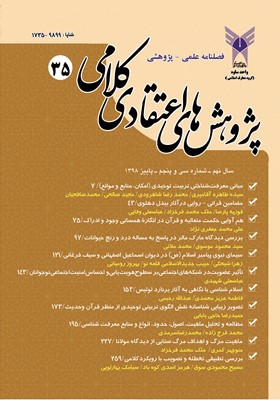بررسی تطبیقی تخطئه و تصویب با رویکردکلامی
محورهای موضوعی : کلام اسلامیمسیح محمودی سوق 1 , هرمز اسدی کوه باد 2 , سیامک بهارلویی 3
1 - دانشگاه آزاد اسلامي (خوراسگان)،
2 - آزاد اسلامی رامهرمز
3 - خوراسگان اصفهان
کلید واژه: تخطئه و تصویب, مقایسه و تطبیق, تشریع بشری و علم الهی, تقریب و تفاهم,
چکیده مقاله :
تخطئه و تصویب، دو نگرش موجود و پرسابقه میان متکلمان مسلمان و فقیهان فریقین است. خاستگاه تصویب در میان اهل سنت و تخطئه نیز ریشه و مبنایی شیعی دارد. از آن جا که دو طایفه شیعه و اهل سنت در مسئله خلافت و جانشینی پیامبر دچار تعارض و اختلاف بوده اند، مسائلی از این دست نیز به تقابل بیشتر دیدگاه های آن ها انجامیده است. مطالعات موجود میان حوزویان و پژوهشگران دانشگاه ها در این زمینه غالباً رنگ و بوی توصیف و تبیین صِرف دارد. نگاه عمیق و دقیق به هر دو مساله تصویب و تخطئه برای شناسایی چالش های کلامی وکارکردی این نظریات دلیل اصلی پژوهش بوده است. در این تحقیق علاوه بر توصیف و تبیین هر دو مقوله، اشکالات کلامی این دیدگاه ها با بررسی جامعیت یا نقص دین در نگاه تصویب و نیز مشکل تکفیر و نسبت آن با تخطئه مورد بررسی قرار گرفته است. در کنار تعارض و تنافی دو دیدگاه، همسانی و وحدت محتوایی دو نظریه و نیز برخی ابعاد مثبت و سازنده فکر تصویب نیز از دیگر یافتههای محقق بوده است.
Proscription and approval are two precedent approaches among the Muslim petitioners and clergymen. Approval originates from Sunni principles while proscription has a root in Shiite ones. Since two tribes of shiite and Sunnite have had disputes on the issue of the caliphate of prophet this kind of above -mentioned issues caused a distinction between their approaches more and more. The studies done by researchers in academic centers and religeous schools are often descriptive and merely illustrative. A deep and precide look at both the issue of proscription and approval of kalami functional challenges of these views was the main reason for the study. In this research, in addition to descriping and explaining both categories. The kalami errors of these views are reviewed by examining the comprehensiveness or deficiency of religion from the perspective of approval and also the problem of excommunication and its relation with the proscription has been examined. Bisides the contrast and paradox of the tow approaches, equality and unity of the content of tow views and some of the positive and constructive aspects of the thought of approval have been other findings from the researcher.
